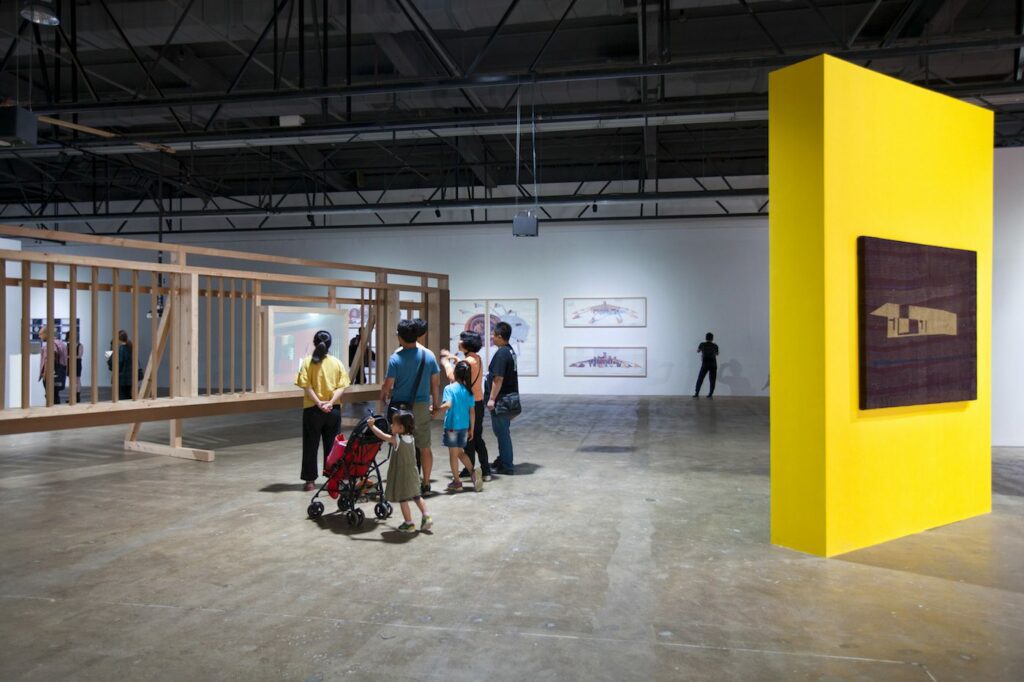various venues, Gwangju, South Korea
07 Sep 2018 - 11 Nov 2018

Angela Ferreira, Independence Cha Cha, 2014. Wood, 2 channel video with sound, photomontage. Collection of Museum of Art, Architecture and Technology (MAAT), Lisbon
The 2018 Gwangju Biennale Imagined Borders will see 165 artists from 43 different countries participate in a series of seven exhibitions exploring the political, cultural, physical and emotional concepts of borders in today’s global community. For this edition of the Gwangju Biennale, a collective of 11 curators from around the world will devise a program of thematic exhibitions, in addition to a monumental new program, the GB Commission and a series of Pavilion Projects taking place across the city of Gwangju from 7 September – 11 November 2018.
Confronting critical issues surrounding globalization, cold wars, asylum seekers, migration and development, Imagined Borders will seek to amplify contemporary political and social issues through the representation of artists and collectives from around the world. This year will see the launch of a series of institutional partnerships for the Gwangju Biennale, titled The Pavilion Project. Occupying historic and cultural locations across the city of Gwangju, The Pavilion Project will present a series of satellite exhibitions from leading international institutions including Palais de Tokyo, the Helsinki International Artist Programme and the Philippine Contemporary Art Network. The Pavilion Project will be a forum for exchange and debate between countries, as these institutions present the work of emerging artists from their home countries and Korea.
Following the Gwangju Biennale’s tradition for showcasing the best in contemporary Asian art, this edition will see the greatest number of Korean artists participate, including an exhibition of contemporary Chosunhwa paintings from North Korea. Curated by B.G. Muhn, professor of painting and drawing at Georgetown University, the North Korean art section will feature works produced in the Mansudae Art Studio in Pyeonyang by 32 painters in the Chosunhwa style, combining modern and traditional techniques. The exhibition will examine the current division of the Korean peninsula, opening a forum for discussions on socialism and realism within the arts.
The 12th edition of the Gwangju Biennale will also see the launch of a monumental new program, the GB Commission which will bring together four international contemporary artists including Adrián Villar Rojas and Mike Nelson to devise site specific artwork exploring the history of the city of Gwangju and advocating for democracy, human rights and peace to a global community. The GB Commission will expand on the history and spirit of Gwangju through the visual arts.
Multiple curators from the UK to LA, Singapore to Seoul have brought their diverse perspectives and expertise to the Biennale and collaborated on projects inspired by the concept of Imagined Borders. Based on their expertise in sociology, politics, migration and the refugee experience, the curators confirmed a list of 165 participating artists within seven thematic exhibitions and the GB Commission which will reflect contemporary society and amplify the level of diverse voices in the cultural community. Highlights of the presentation will include the Cuban artist collective Los Carpinteros; Belgian-born and Mexico-based artist Francis Alÿs, Jordan-based curator and artist Ala Younis who devised the first Kuwait Pavilion at the 55th Venice Biennale, and French artist based between Berlin and Algeria, Kader Attia, whose work explores the legacy of migration, colonialism and trade to interrogate the idea of a collective cultural memory.
Reflecting its position as the largest Asian Biennale to explore the history of Asian identity and values, this year’s edition of the Gwangju Biennale will see the greatest number of Asian artists participating so far, with 66% of the artists coming from Asia. Artists from South America and the Middle East are also represented, continuing the Gwangju Biennale’s founding ideologies of breaking away from Eurocentric discussions and presenting issues from regional and marginal borderlines to trigger a shift from the central axis of contemporary art.
The increase in global visibility for Asian artists is represented through this expanded program of artists from across the continent; including Thailand-born filmmaker Apichatpong Weerasethakul, winner of the Palme d’Or at the 2010 Cannes Film Festival; Shilpa Gupta who explores Asian identity in his work; Ho Tzu Nyen whose Singapore Pavilion at the 2011 Venice Biennale brought an immersive, panoramic view of pre-colonial Singapore to the Italian island; and Yoshimoto Nara, pioneer of Japanese pop art will participate in this year’s Gwangju Biennale.